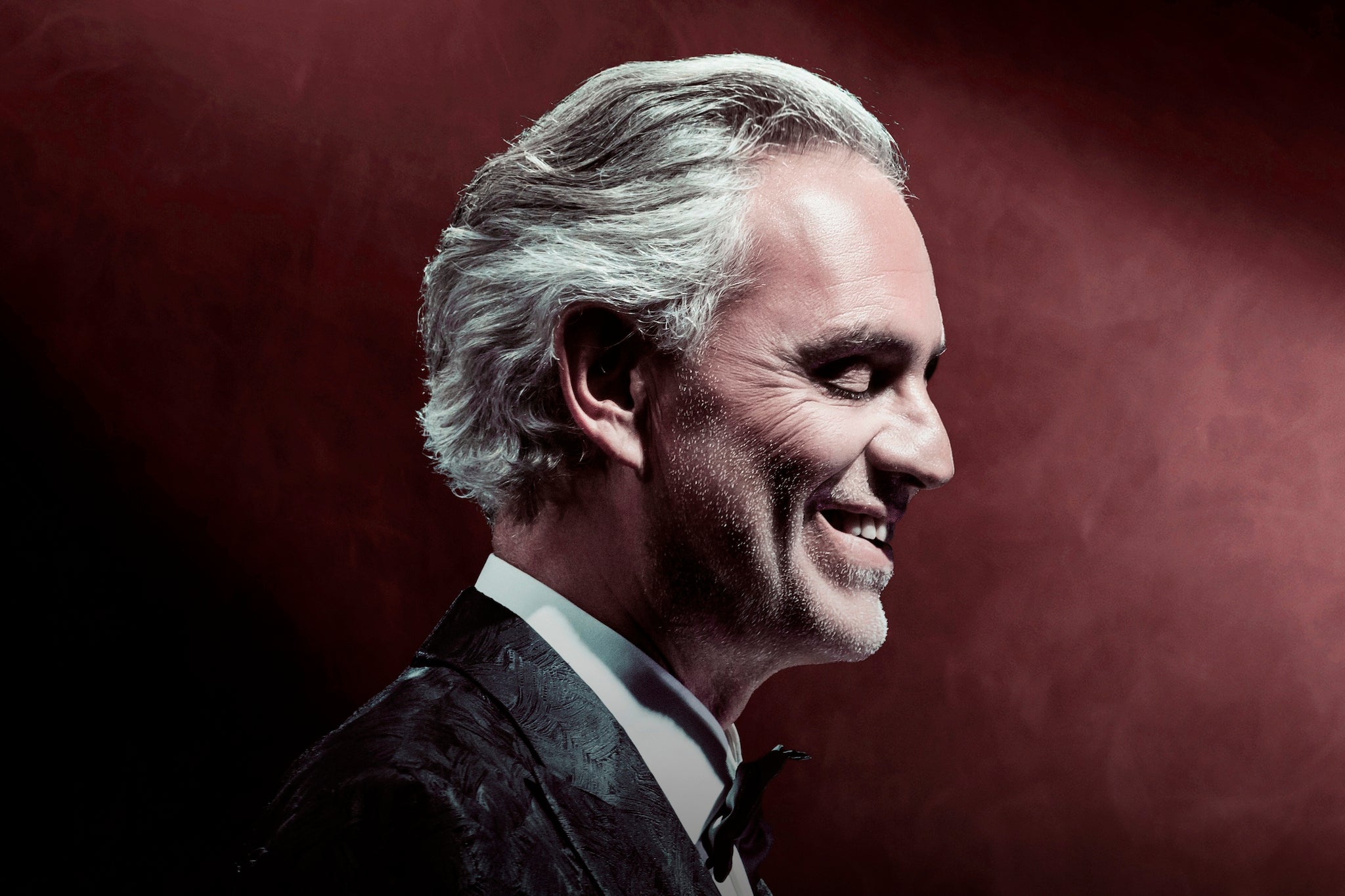How Andrea Bocelli became the popular face of opera and the voice of the John Lewis Christmas ad
It’s no wonder that John Lewis selected the famed Italian tenor to voice their adorable new Christmas ad, writes Helen Brown. Despite classical critics often turning their nose up at him, he has long been anointed as the people’s opera superstar


Your support helps us to tell the story
From reproductive rights to climate change to Big Tech, The Independent is on the ground when the story is developing. Whether it's investigating the financials of Elon Musk's pro-Trump PAC or producing our latest documentary, 'The A Word', which shines a light on the American women fighting for reproductive rights, we know how important it is to parse out the facts from the messaging.
At such a critical moment in US history, we need reporters on the ground. Your donation allows us to keep sending journalists to speak to both sides of the story.
The Independent is trusted by Americans across the entire political spectrum. And unlike many other quality news outlets, we choose not to lock Americans out of our reporting and analysis with paywalls. We believe quality journalism should be available to everyone, paid for by those who can afford it.
Your support makes all the difference.From heart-breaking sorrow to bonkers bombast, Andrea Bocelli packs the full gamut of operatic emotion into “Festa”, the first original song to feature on a John Lewis Christmas advert in years. Written by Italian electro-pop duo Le Feste Antonacci, the track gives 65-year-old Bocelli a glorious opportunity to showcase his talent for being the average Joe’s idea of An Opera Singer. Unlocking intensely theatrical passion with tonsil-wobbling style, Bocelli dials directly into a classical Italian tradition hinting at emotions more timeless than those conveyed by more fleeting, vernacular pop.
Classical critics struggle to understand his appeal. They say his voice is too thin (thinning to the point of strangulation as his pitch rises). They say his phrasing is poor and jumbled. They sniff at his recording of popular songs in classical style. Yet the Tuscan tenor has sold 75 million records around the world, making him the most commercially successful singer in the history of classical music.
In 2006, the New York Times’ opera critic Bernard Holland attended a Bocelli concert in which the star appeared with the New York Philharmonic and briskly catalogued flaws in the star’s technique. But he was still moved by the force of Bocelli’s ability to connect with his audience. “Accusing audiences of being gullible won’t wash,” he wrote. “The music public can only be conned for a short time and Mr Bocelli’s success is of reasonably long standing. There is something physical or metaphysical – something beyond music – that must draw people to Andrea Bocelli. That is a talent in itself.”
It’s a talent that the late Luciano Pavarotti noticed early in Bocelli’s career. When, in 1992, Italian pop star Zucchero sought a tenor to sing his song “Miserere”, he sent Pavarotti a tape and invited the maestro to record it. “Thank you for writing such a wonderful song,” Pavarotti is reported to have replied. “Yet you do not need me to sing it – let Andrea [Bocelli] sing ‘Miserere’ with you, for there is no one finer.” Pavarotti wasn’t just shunting on work. He loved Bocelli’s voice so much that he invited him to sing at his wedding. After Pavarotti’s death in 2007, Bocelli also sang at his funeral.
The hook-up brought Bocelli into the world of classical crossover music just as the genre was peaking, with operatic arias blasting out across football stadiums across the world. Bocelli would soon be mingling with pop and rock royalty. There were parties with Sting and Brian May. These artists also responded to the crackle of charisma with which the tenor seems to have been born.
“Some of us are born with a weakness for music,” he told The Guardian. “As a baby, music would stop whatever thought I was having. If I was worried, it would stop me worrying; if I was crying, it would stop me crying. Music was a healing thing for me. I always knew I would sing.”
Not that Bocelli appears to have spent much of his early life studying musical scores. Born in rural Tuscany in 1958, he was quickly diagnosed with congenital glaucoma which caused impaired vision. But – nicknamed The Earthquake by his family – he didn’t let his poor vision slow him down.
He was raised on an idyllic-sounding Tuscan farm where his parents sold farm machinery and made their own wine. “I was very very lively. I was always looking for danger. I was always galloping horses without a saddle, I was crazy,” he told The Daily Telegraph.
A footballing accident saw him rendered completely blind at the age of 12. He suffered a brain haemorrhage and doctors used leeches in a vain attempt to save his vision. But he has always refused to be defined by his disability – often refusing to address it in interviews and arguing that his loss of the visual world has no connection with his ability to express himself so powerfully in the sonic world.
Enjoy unlimited access to 100 million ad-free songs and podcasts with Amazon Music
Sign up now for a 4 month free trial (3 months for non-Prime members)
Enjoy unlimited access to 100 million ad-free songs and podcasts with Amazon Music
Sign up now for a 4 month free trial (3 months for non-Prime members)
Bocelli won his first singing competition at the age of 14 – for singing Cornetto-shifting Neapolitan classic “O Sole Mio”. But he didn’t bet the farm on a stage career and studied law at university in Pisa. “I’m incredibly competitive by nature,” he once said. “That is why it is not surprising that I was a lawyer before I was a singer.” But throughout his studies he continued singing in bars at night. After graduation he practised law for a year before committing to singing, sending off the tapes that would get Pavarotti and Zuchero’s attention. Having made his name in the pop world, he then sought credibility in the classical world, performing his first major opera role – playing Macduff in Verdi’s Macbeth – in Pisa in 1994. During this period, reading Tolstoy caused the formerly agnostic Bocelli to kindle the strong Catholic faith that he continues to say guides and grounds him.
His Christianity also gives him a deep, spiritual connection to Christmas. In 2009 – the same year he opened the UEFA Champions League with a rousing rendition of “Il Gladiatore” from the Gladiator soundtrack – he released his first Christmas album, My Christmas. The record included duets with Mary J Blige, Katherine Jenkins and The Muppets. That December, in London, he watched the Oxford Street lights be switched on, then led the St Paul’s Cathedral Choir (and 14,000 regular folk) in a blast of “Silent Night”. It was an event that broke the Official Guinness World Record for the biggest-ever Christmas carol sing-along.

New fans wishing to dive deeper into Bocelli’s life should check out his fictionalised 1999 memoir The Music of Silence, published in the same year he became, at 40, the oldest person ever to be nominated for a Grammy for Best New Artist. The Music of Silence was turned into a film in 2017. The film’s director, Michael Radford, said that Bocelli’s appeal lies in the fierce force of his nature. Physically, Bocelli is still “extremely courageous”, Radford told Classic FM. “He rides horses and does all sorts of things that you wouldn’t imagine that someone who is blind would do with the degree of skill that he achieves. You see him walking round the place. Last time I went to see him, he greeted me on an Andalusian stallion that was walking only on its hind legs and he was controlling it. Amazing. Then he galloped into the distance.” Bocelli now owns a stable of horses, which he prefers to ride at night. He also surfs, windsurfs, rollerblades and skis.
“Love, for me, is always at first sight,” Bocelli told The Guardian. “If you have love that comes after a while, it’s not real, not genuine. Love is at once or never.” But he also argues that: “Sex is the enemy of the athlete and the artist. Footballers need to rest before a match; singers, too, need to have time to think about themselves by themselves.” Married first – to Enrica Cenzatti – in 1992, he became a father (to sons Amos and Matteo) in his late twenties. He’s currently married to his manager, Veronica Berti, 26 years his junior. They welcomed a daughter, Virginia, in 2011. “I’ve sung for my daughter Virginia since she was conceived,” he said in the same interview. “She loves music and she always calms down when I sing.”
I’m not sure how many children will be “calmed” by his raucous new addition to the Christmas canon. But he’s bound to inspire some seasonal comfort and wild festive joy.
Join our commenting forum
Join thought-provoking conversations, follow other Independent readers and see their replies
Comments